9.7 From Plate to Planet
backHave you ever wondered how we can keep our favourite foods fresh and tasty even when they’re not in season, or when we don’t get to eat them right away? That’s what food preservation is all about!
By learning to preserve food, we can save leftovers, cut down on food waste, and keep delicious foods for months—or even years! 🕰️💚 Imagine enjoying summer strawberries in winter or having snacks ready for months without them going bad. Plus, it’s like a fun science experiment where we learn all kinds of ways to keep our food fresh and safe.
| Canning | 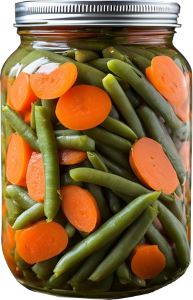 |
|
| Vegetables: Green beans, carrots, tomatoes, and corn.
Fruits: Apples, peaches, strawberries, and pears. Others: Sauces (like tomato sauce), jams, and jellies. |
Canning is like giving your food a long vacation! You put food in jars or cans, heat it up to kill bacteria, and seal it tight. This keeps the food fresh for months or even years, so you can enjoy your favorite fruits, veggies, or sauces later. | |
________________________________________________
| Drying | 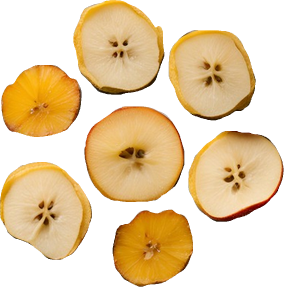 |
|
| Vegetables: Bell peppers, onions, mushrooms, and zucchini.
Fruits: Apples, bananas, mangoes, and grapes (which become raisins!). Others: Herbs like basil, rosemary, and thyme |
Drying is like taking the water out of food so that bad bacteria can’t grow. You can dry fruits, veggies, and even meats like jerky, and it helps the food last longer. You can dry food by leaving it in the sun or using special machines called dehydrators. | |
________________________________________________
| Fermentation | 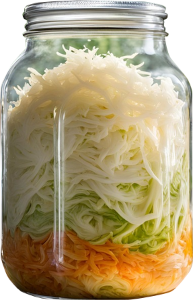 |
|
| Vegetables: Cabbage, cucumbers, and carrots.
Fruits: Apples (to make cider) and grapes (to make wine). Others: Dairy (milk for yogurt), soybeans (for miso), and tea (for kombucha). |
Fermentation is a natural process where tiny bacteria turn sugars into other things like acids or alcohol to preserve food. This makes yummy foods like yogurt, pickles, and kimchi. It’s like letting the good bacteria work their magic! | |
________________________________________________
| Salting | 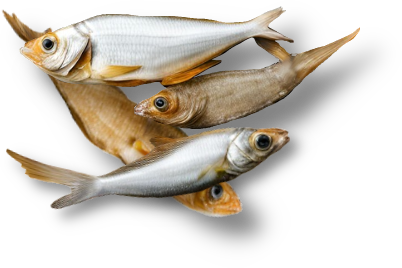 |
|
| Vegetables: Not commonly salted alone
Meats: fish, bacon, and ham. Others: Cheese (like feta) |
Salting is when you cover food with salt to draw out the water and stop bacteria from growing. This is especially good for meats and fish, and sometimes, they even smoke the food to make it extra tasty. Salt helps keep the food safe for a long time! | |
________________________________________________
| Pickling | 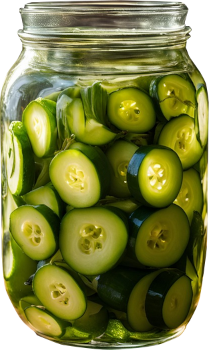 |
|
| Vegetables: Cucumbers, carrots, beets, and cauliflower.
Fruits: Green mangoes and lemons. Others: Eggs and garlic. |
Pickling is when you soak food in vinegar or saltwater to keep it fresh. The strong flavors and acids stop the food from going bad. Pickled cucumbers, onions, or even fruits can stay good for months! | |
________________________________________________
- Which preserved food do you eat most often? 🥒 Is it canned, pickled, dried, or something else?
- Are there any preserved foods that you buy often? 🛒 What do you usually get?
Canning
- Have you ever tried canned vegetables or fruits? 🥫 Which ones do you like the best?
- Would you ever want to learn how to can something? 🔥 What food would you try first?
Drying
- Have you had dried fruits or snacks, like apple chips or raisins? 🍎 Do you like them better than fresh ones?
- If you could dry any fruit to make a tasty snack, which one would you pick? 🍌
Fermentation
- Have you tasted fermented foods like yogurt or pickles? 🍶 Do you like their sour taste?
- Do you know how yogurt or kombucha is made? 🧪 Would you like to try making it?
Pickling
- What’s your favorite pickled food? 🥒 Have you ever helped make pickles?
- If you could pickle any vegetable, what would you choose? 🌶️
Salting
- Do you know any foods that are preserved with salt? 🧂 What do you think of their taste?
- If you had to preserve a food with salt, which one would you choose?
